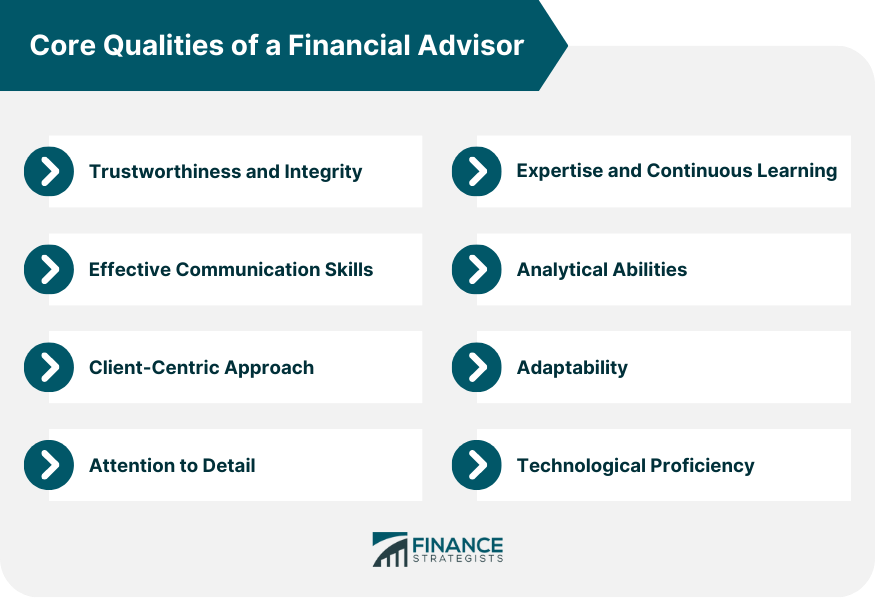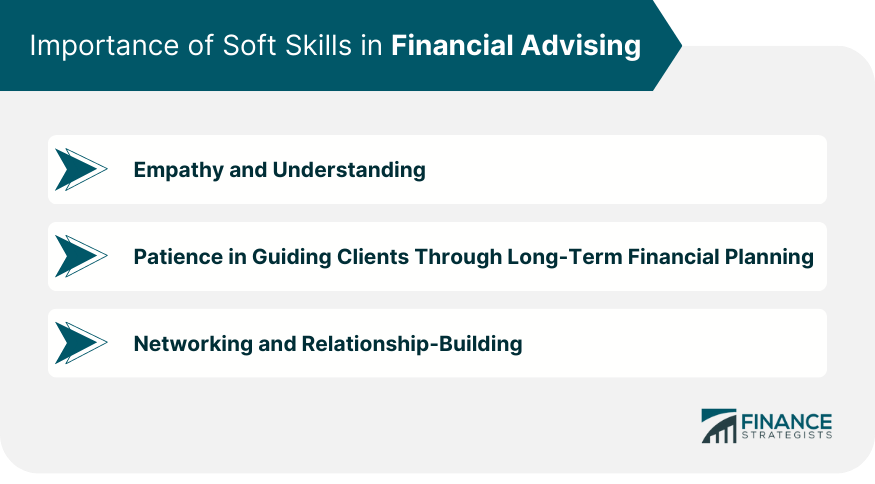A financial advisor plays a pivotal role in shaping an individual's or an organization's financial future. Their responsibilities span from offering personalized financial advice based on a client's goals and financial situation to suggesting specific investments, insurance decisions, tax planning, and retirement strategies. However, not all financial advisors are created equal. Choosing the right financial advisor is crucial because the guidance you receive can significantly impact your financial security and growth. A competent and trustworthy advisor can help you make informed decisions, avoid potential pitfalls, and capitalize on opportunities you might otherwise overlook. As your financial landscape evolves with life changes, market fluctuations, and economic shifts, having the right advisor by your side can be the difference between financial success and missed opportunities. At the foundation of any financial advisor-client relationship lies trust. Clients entrust their hard-earned money and their financial future to advisors. Upholding fiduciary responsibilities means that the advisor always acts in the best interest of the client, prioritizing their needs over commissions or external pressures. Being transparent ensures there's no room for doubts or misunderstandings. Honesty cultivates a lasting relationship, ensuring clients feel secure in every financial endeavor. The finance landscape is ever-evolving, with regulations, market dynamics, and investment vehicles continuously shifting. An accomplished financial advisor possesses necessary certifications such as CFP (Certified Financial Planner) or CFA (Chartered Financial Analyst), affirming their competence and credibility. The world of finance never stands still; therefore, an advisor's commitment to learning is evidence of dedication to their craft. Continual education equips them to navigate the latest industry challenges, providing optimal advice to clients. Financial concepts can be intricate and overwhelming. An adept advisor has the ability to break down these complex ideas into simpler, more digestible terms, ensuring clients feel informed and confident in their decisions. Conversations go beyond mere transactions; they are bridges to understanding client aspirations. Active listening paves the way for collaboration, tailoring strategies that resonate with a client's life and dreams. Beyond interpersonal skills, a proficient advisor excels in data analysis. They are skilled at assessing market conditions, identifying lucrative investment opportunities, and understanding the nuances of risk. An advisor's analytical prowess is their compass, guiding clients through financial mazes. Every number, trend, and ratio paints a story, and the advisor's job is to decode and leverage this for the client's advantage. Every client's financial situation, goals, and risk tolerance are unique. A top-notch advisor recognizes this, offering personalized financial plans rather than one-size-fits-all solutions. This bespoke approach means every recommendation is handpicked, echoing the client's voice and vision. It's not just about financial growth but ensuring that growth aligns with the client's personal and life values. Financial markets are notorious for their volatility. An agile advisor is quick to adjust strategies in response to market changes, economic indicators, or shifts in a client's personal circumstances, ensuring that the client remains on track toward achieving their financial goals. Change is the only constant, and an advisor's adaptability signifies resilience and foresight. They remain unfazed, crafting strategies that capitalize on opportunities. Mistakes, however small, can have significant repercussions. A meticulous advisor ensures precision in financial projections and analyses, leaving no stone unturned. In the vast expanse of numbers and regulations, their hawk-eyed approach ensures that every decimal and directive is in its rightful place, optimizing client outcomes. A modern advisor is familiar with cutting-edge financial planning software and tools, leveraging technology to offer efficient and comprehensive services. In a digitized world, their technological adeptness enhances client experiences, making interactions seamless and solutions more accessible. Embracing fintech innovations ensures they're always a step ahead. An exceptional financial advisor recognizes that behind every investment goal or retirement plan is a human story. Empathy allows advisors to tap into these stories, understanding not just the financial objectives but the emotions driving them. By appreciating the anxieties, hopes, and challenges their clients face, advisors can offer advice that resonates on a personal level, making the financial journey feel more aligned with life's broader narrative. In times of market turbulence or personal financial stress, this empathetic approach reassures clients, affirming that their advisor recognizes the weight of their concerns and is committed to their well-being. Financial planning requires a vision that spans decades and a commitment to strategies that may take years to yield tangible results. Patience is pivotal for an advisor to guide clients through this long-haul journey. By exemplifying patience, advisers reassure clients during moments of doubt or impatience, reminding them of the bigger picture and the value of perseverance. This approach becomes especially crucial when explaining intricate financial concepts or when encouraging clients to stick to their strategies during volatile market conditions. An advisor with robust networking skills can tap into a diverse range of expertise, bringing more value to their clients. It's not just about knowing the right people but building and nurturing genuine relationships within the industry. These relationships often lead to collaborative efforts, access to exclusive investment opportunities, or insights into emerging market trends. For clients, an advisor with a strong network means having a finger on the pulse of the financial world, ensuring they're equipped with the latest tools, products, and knowledge. A financial advisor's role in shaping financial destinies is undeniable. Their guidance spans from tailored advice to investment strategies, retirement planning, and tax optimization. Selecting the right advisor is paramount, as their impact on financial security and growth is significant. Key skills of an effective advisor include trustworthiness, integrity, and transparency. Expertise, continuous learning, and adaptability are crucial to navigating the evolving financial landscape. Strong communication skills bridge the gap between complex concepts and client understanding. Analytical abilities decode market intricacies, while a client-centric approach ensures personalized solutions aligned with individual aspirations. Soft skills like empathy and patience elevate advisory services. Ultimately, a proficient financial advisor is a beacon through life's financial complexities, offering not just expertise but also a partner committed to clients' financial well-being and success.What Is a Financial Advisor?
Core Qualities of a Financial Advisor
Trustworthiness and Integrity
Expertise and Continuous Learning
Effective Communication Skills
Analytical Abilities
Client-Centric Approach
Adaptability
Attention to Detail
Technological Proficiency

Importance of Soft Skills in Financial Advising
Empathy and Understanding of Client Emotions
Patience in Guiding Clients Through Long-Term Financial Planning
Networking and Relationship-Building Capabilities

Conclusion
Qualities of a Financial Advisor FAQs
The key qualities of a financial advisor include trustworthiness, expertise, effective communication, adaptability, and a client-centric approach.
Trustworthiness is vital as clients entrust their financial future to advisors. Upholding fiduciary responsibilities ensures advisors act in the best interest of clients, prioritizing their needs over external pressures.
Effective communication helps advisors break down complex financial concepts into understandable terms. This ensures clients feel informed and confident in their decisions, leading to better collaboration and tailored strategies.
Adaptability enables advisors to adjust strategies to changing market conditions and client circumstances. This resilience ensures clients stay on track toward their financial goals despite market volatility.
A client-centric approach recognizes each client's unique financial situation, goals, and risk tolerance. By offering personalized solutions, advisors ensure recommendations align with clients' values, aspirations, and needs.
True Tamplin is a published author, public speaker, CEO of UpDigital, and founder of Finance Strategists.
True is a Certified Educator in Personal Finance (CEPF®), author of The Handy Financial Ratios Guide, a member of the Society for Advancing Business Editing and Writing, contributes to his financial education site, Finance Strategists, and has spoken to various financial communities such as the CFA Institute, as well as university students like his Alma mater, Biola University, where he received a bachelor of science in business and data analytics.
To learn more about True, visit his personal website or view his author profiles on Amazon, Nasdaq and Forbes.











